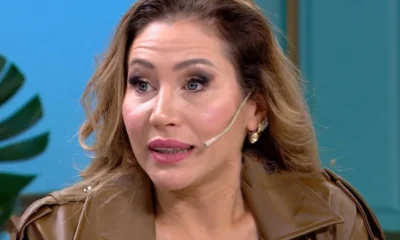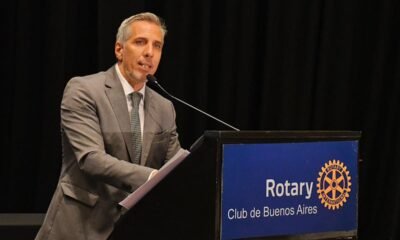INTERNACIONAL
Russian official says Moscow has ‘no intention’ of supplying Iran with warheads, following Trump taunts
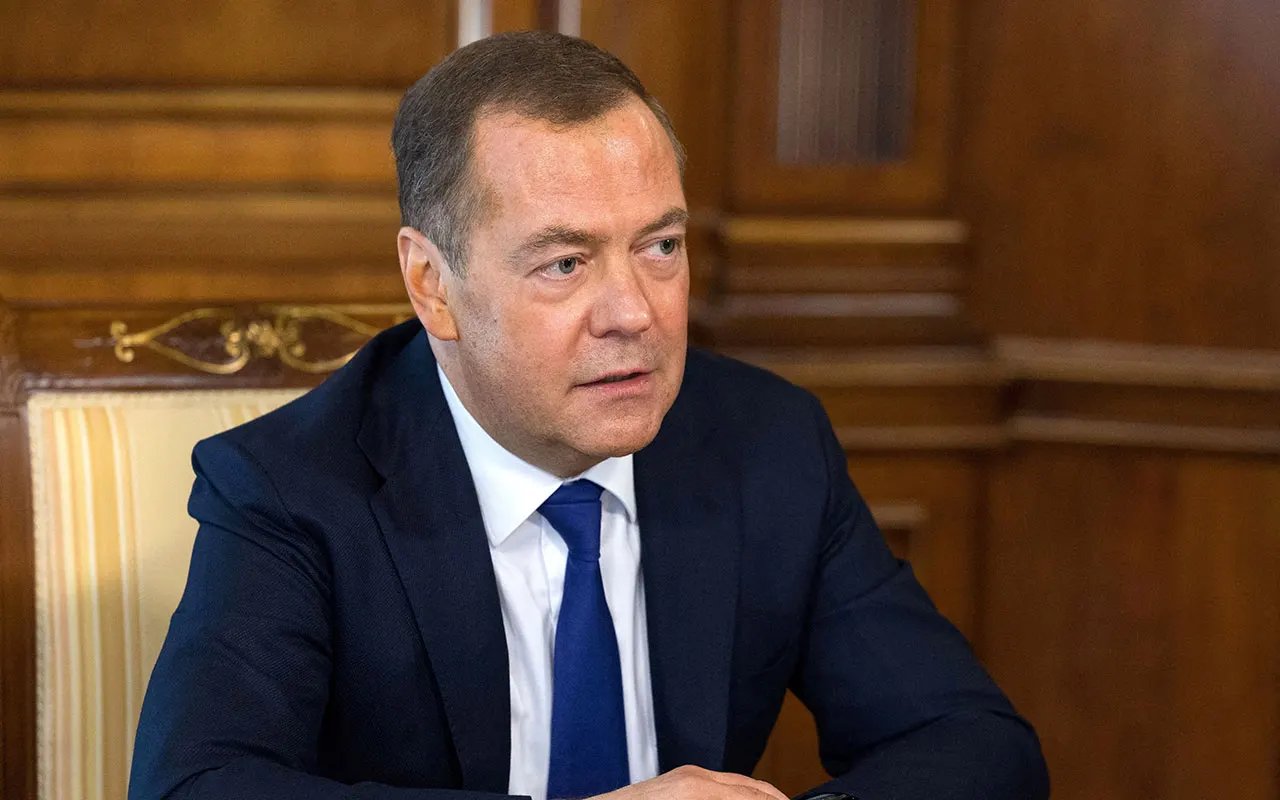
NEWYou can now listen to Fox News articles!
Former Russian President Dmitry Medvedev said that Moscow is not planning to supply Iran with nuclear warheads, after President Donald Trump mocked him for suggesting that other countries would step in and provide Iran with nuclear weapons after the U.S. strikes against Iranian nuclear facilities.
Medvedev, now the deputy chairman of the Security Council of Russia, originally said Sunday that Iran would continue to advance its nuclear program and would receive assistance from other nations to do so.
Although Medvedev did not specify any countries, he clarified later Monday that he was not talking about Russia.
«I condemn the U.S. strike on Iran — it failed to achieve its objectives,» Medvedev said in a Monday post on X. «However, Russia has no intention of supplying nuclear weapons to Iran because, unlike Israel, we are parties to the Nuclear Non-Proliferation Treaty.»
TRUMP SLAMS RUSSIA’S CASUAL THREAT TO ARM IRAN WITH NUCLEAR WEAPONS: ‘THAT’S WHY PUTIN’S THE BOSS’
Russian Deputy Chairman of the Security Council Dmitry Medvedev takes part in a wreath-laying ceremony marking Defender of the Fatherland Day at the Tomb of the Unknown Soldier by the Kremlin Wall in Moscow on Feb. 23, 2024.
«I know quite well what this would entail, having overseen our nuclear forces as president,» Medvedev said. «But other countries might — and that’s what was said.»
Medvedev’s statement came after Trump called him out by name in a post on Truth Social following the Russian leader’s original Sunday remarks.
«Did I hear Former President Medvedev, from Russia, casually throwing around the ‘N word’ (Nuclear!), and saying that he and other Countries would supply Nuclear Warheads to Iran? Did he really say that or, is it just a figment of my imagination? If he did say that, and, if confirmed, please let me know, IMMEDIATELY. The ‘N word’ should not be treated so casually. I guess that’s why Putin’s ‘THE BOSS,’» Trump said in a Monday Truth Social Post.
Andrea Sticker, the deputy director of the Foundation for Defense of Democracies’ nonproliferation and biodefense program, chalked up Medvedev’s initial statement as an attempt to brag and said it was unrealistic for any country to provide such assistance to Iran.
«Medvedev’s original claim was likely bluster about Russia or another country supplying Iran with nuclear weapons,» Stricker said in a Monday email to Fox News Digital. «No country, including Pakistan or North Korea, would supply atomic devices to Tehran because they would be held accountable by the United States if Iran used the weapons. Moscow and Pyongyang, at least from available open-source information, appear to be standing mostly idle as their ally Iran takes a major beating.»
RUSSIAN LEADER CLAIMS MULTIPLE COUNTRIES PREPPED TO PROVIDE IRAN NUCLEAR WEAPONS FOLLOWING US STRIKES
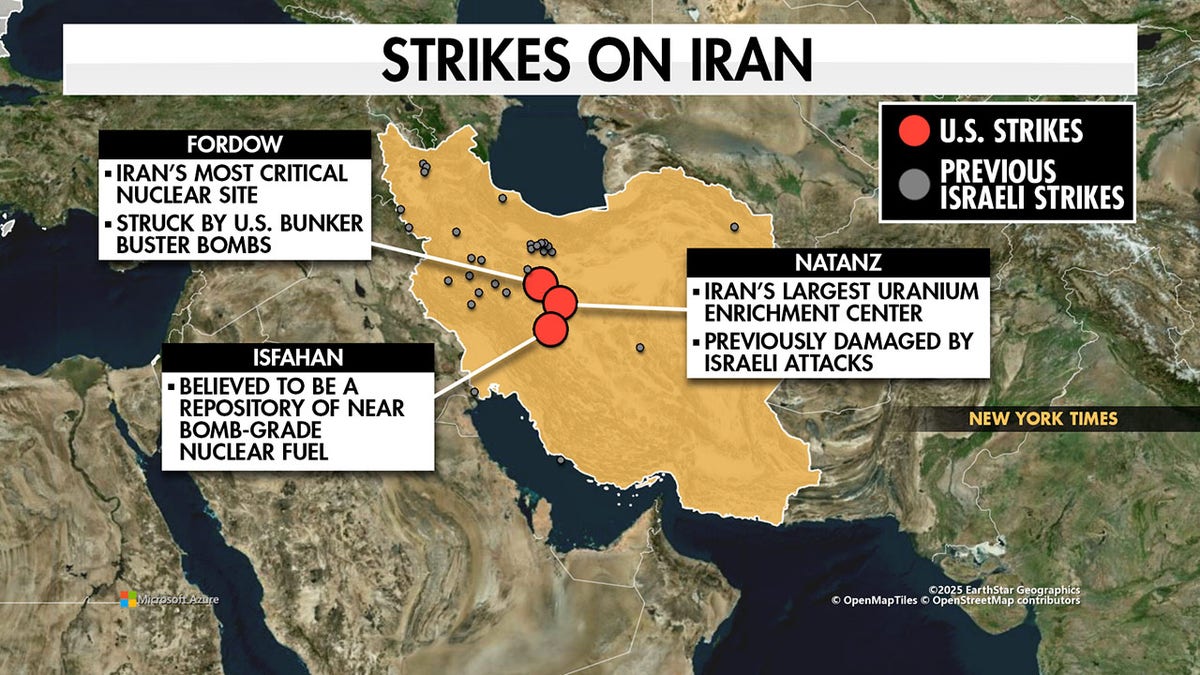
A map shows nuclear sites in Iran that were struck by the United States during Operation Midnight Hammer. (Fox News)
The U.S. launched strikes late Saturday targeting key Iranian nuclear facilities, which involved more than 125 U.S. aircraft, Chairman of the Joint Chiefs of Staff Gen. Dan Caine told reporters Sunday.
Trump announced early Tuesday that a ceasefire had gone into effect between Israel and Iran but scolded both countries hours later following accusations from both sides that the other had violated the agreement.
ISRAEL-IRAN CONFLICT: LIVE UPDATES
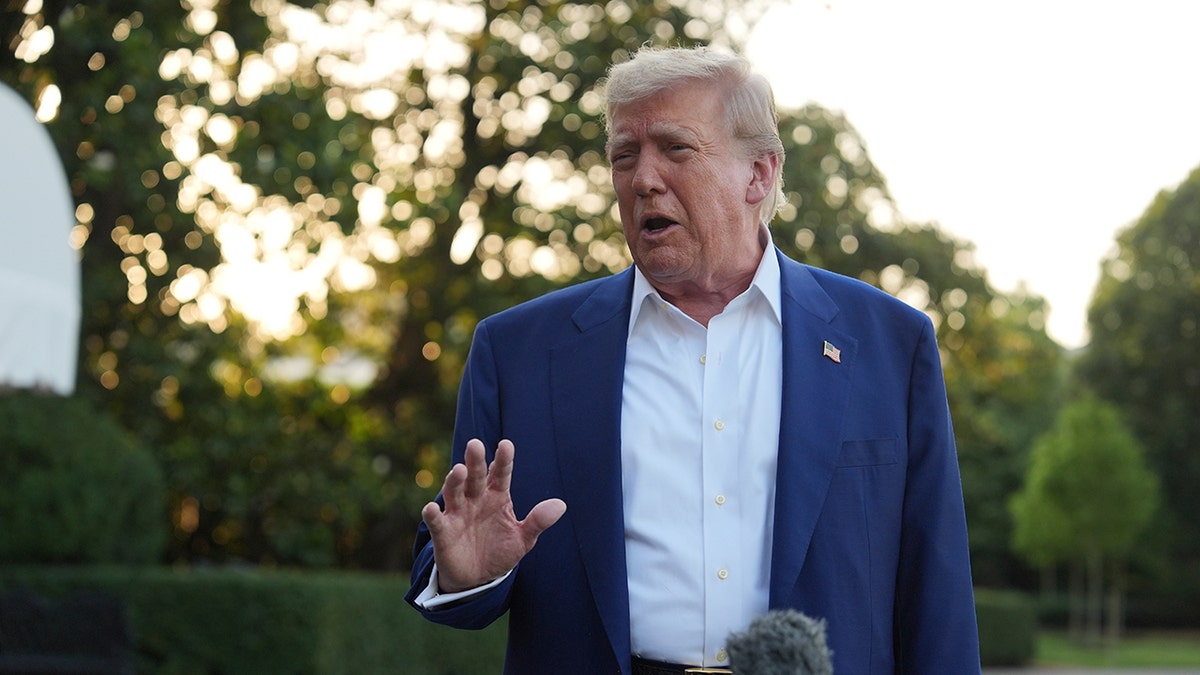
President Donald Trump slammed «fake news» outlets for downplaying the success of the U.S. strikes on Iran while talking to reporters before boarding Marine One on the South Lawn of the White House on June 24, 2025. (Evan Vucci/The Associated Press)
Trump told reporters both Israel and Iran failed to follow the terms of the agreement, which he said is still in effect.
«I’m not happy with them. I’m not happy with Iran either but I’m really unhappy with Israel going out this morning,» Trump said at the White House Tuesday morning.
«We basically have two countries that have been fighting so long and so hard that they don’t know what the f— they’re doing,» he said.
INTERNACIONAL
La neurociencia revela cómo se forman y modifican los hábitos
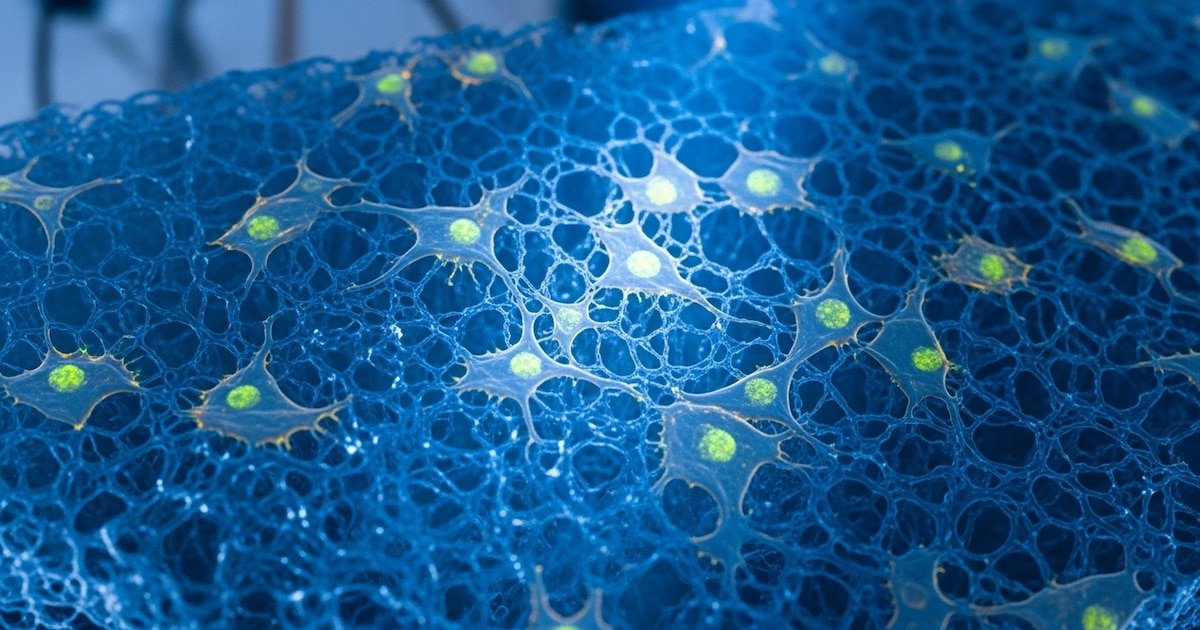
La neurociencia ha demostrado que los hábitos, esos comportamientos automáticos que moldean la rutina diaria y repercuten en la salud mental, surgen de la interacción entre dos sistemas cerebrales: uno responsable de responder a estímulos y otro orientado por metas y creencias.
Esta perspectiva, presentada mediante un estudio publicado en enero de 2025 por investigadores del Trinity College Dublin, está transformando la comprensión sobre la formación y modificación de los hábitos, con efectos directos en la vida cotidiana y en el tratamiento de trastornos compulsivos.
Eike Buabang y su equipo destacan el denominado marco de doble sistema. Este concepto, respaldado por la neurociencia cognitiva, sostiene que los hábitos resultan del equilibrio entre un sistema de control dirigido por objetivos —basado en la evaluación consciente de acciones y resultados— y un sistema estímulo-respuesta, que automatiza conductas frente a señales familiares.
Cuando el sistema estímulo-respuesta domina, las personas tienden a repetir acciones sin analizar su relación con metas actuales, lo que puede derivar en errores, impulsividad o conductas compulsivas. Como señalan Buabang y sus colegas: “Los hábitos pueden entenderse como un balance entre un sistema impulsado por estímulos, basado en asociaciones estímulo-respuesta, y un sistema dirigido por objetivos, basado en expectativas acción-resultado y metas valoradas”.

La formación de hábitos responde a varios mecanismos clave. Destaca la repetición, ya que cada vez que una conducta se repite en un contexto similar, las conexiones neuronales entre estímulo y respuesta se refuerzan, facilitando su automatización. No obstante, el estudio muestra que la evidencia es dispar sobre cuántas repeticiones se requieren: algunos trabajos sitúan el rango entre 18 y 254 días, según el tipo de hábito y características de la persona.
El refuerzo —la obtención de consecuencias positivas tras la acción— fortalece los hábitos, gracias en parte a la dopamina en regiones cerebrales como el putamen posterior. Además, cuando se desactivan los procesos dirigidos por objetivos, por presión de tiempo, estrés o distracción, el sistema estímulo-respuesta asume el control. La estabilidad del contexto favorece la consolidación de los hábitos, ya que la repetición en entornos previsibles disminuye la necesidad de supervisión consciente y permite que las acciones se encadenen de modo automático.
Existen diferencias individuales y neurobiológicas que influyen en la facilidad para formar o interrumpir hábitos. La estructura y actividad de circuitos como el putamen y la corteza prefrontal dorsolateral varían entre personas, lo que explica por qué algunos adquieren hábitos con rapidez mientras que otros precisan más tiempo o repeticiones. Además, la intensidad de las señales contextuales, la frecuencia de repetición y la motivación —tanto intrínseca como extrínseca— modulan este proceso. Según la investigación: “La duración necesaria para formar un hábito varía considerablemente entre individuos”, lo que resalta la importancia de personalizar las estrategias de intervención.
Romper hábitos arraigados requiere debilitar las asociaciones estímulo-respuesta, evitar los estímulos desencadenantes, potenciar la inhibición dirigida por objetivos y, en muchos casos, crear hábitos alternativos que compitan con los anteriores. La extinción de un hábito no elimina las conexiones previas, sino que genera una nueva asociación entre el contexto y la ausencia de respuesta, lo que explica la propensión a recaer frente a los estímulos originales.
Estrategias como la evitación de contextos problemáticos, el entrenamiento en inhibición y la formación de intenciones de implementación (“si ocurre X, haré Y”) presentan eficacia tanto en entornos experimentales como en la vida cotidiana. Estas técnicas operan en terapias conductuales y farmacológicas, y pueden potenciarse mediante intervenciones como la estimulación cerebral no invasiva, que refuerza el control ejecutivo.

Las aplicaciones clínicas de estos avances resultan especialmente relevantes en trastornos compulsivos, como el trastorno obsesivo-compulsivo (TOC), las adicciones y los trastornos alimentarios. En estos casos, se identifica un déficit en el control dirigido por objetivos, lo que favorece la aparición de hábitos patológicos. Como advierte la investigación: “El trastorno obsesivo-compulsivo, el trastorno por consumo de sustancias y los trastornos alimentarios están vinculados a déficits en el control dirigido por objetivos, posiblemente explicados por una dimensión transdiagnóstica de compulsividad”.
Las terapias más eficaces combinan la exposición a los estímulos desencadenantes, la prevención de la respuesta habitual y el refuerzo de conductas alternativas, lo que permite abordar tanto mecanismos automáticos como procesos conscientes.
A pesar de estos avances, la investigación actual enfrenta desafíos metodológicos y conceptuales. Persisten dificultades para replicar hallazgos clave en humanos y continúa el debate sobre la suficiencia del modelo de doble sistema. Buabang y sus colegas proponen modelos más complejos, integrando la interacción dinámica entre hábitos de pensamiento, creencias automáticas y conductas. La transferencia de hábitos entre contextos y la resistencia al cambio figuran como áreas de estudio aún en desarrollo.
Hacia el futuro, la investigación subraya la importancia de profundizar en los mecanismos subyacentes a la formación y alteración de hábitos, así como adaptar las intervenciones a las distintas características individuales y contextuales. Solo mediante una comprensión más precisa de estos procesos será posible diseñar estrategias realmente eficaces para promover cambios conductuales duraderos y mejorar el abordaje de trastornos relacionados con la compulsividad.
deporte,running,mujeres,parque,ejercicio,vida saludable,mañana,ciudad,bienestar,actividad física
INTERNACIONAL
New York Attorney General Letitia James enters plea in federal mortgage fraud case
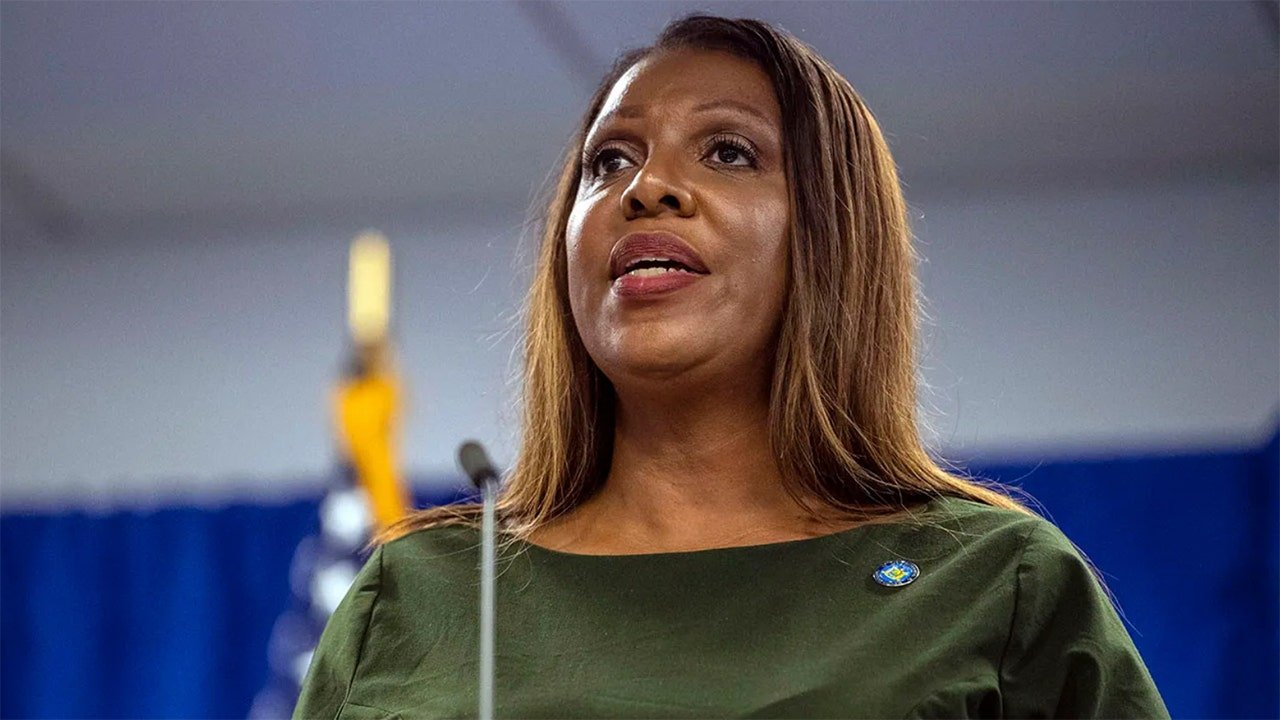
NEWYou can now listen to Fox News articles!
New York Attorney General Letitia James was arraigned at a federal court in Norfolk, Virginia, Friday, where she pleaded not guilty to two felony charges of bank fraud and making false statements to a financial institution.
The charges against James stem from her 2020 purchase of a home in Norfolk, Virginia. Prosecutors allege that James misled a bank about the nature of the residence in order to obtain more favorable loan conditions.
The indictment states that James misrepresented the financial institution in claiming it would be her secondary residence, and instead rented it out to a family.
According to the indictment, the lower interest rate would allow James to save nearly $19,000 over the course of the 30-year loan.
LETITIA JAMES TO BE ARRAIGNED IN VIRGINIA ON FEDERAL BANK FRAUD CHARGES TIED TO 2020 HOME PURCHASE
NY AG Letitia James and President Donald Trump (Getty Images)
James entered the not guilty plea herself to U.S. District Judge Jamar K. Walker.
She is being represented in the case by defense attorney Abbe Lowell, and by Andrew Bosse, a former assistant U.S. attorney based in Norfolk who formerly headed up the office’s criminal division.
James’ arraignment is the latest in a string of prosecutions brought against the president’s perceived political foes, despite objections from career prosecutors — some of whom have since been fired or resigned.
James, a Democrat, has long-drawn Trump’s ire after she campaigned for attorney general in 2016 largely on vows to investigate Trump’s actions and businesses.
She also successfully secured a $450 million civil fraud case against him last year, though an appeals court later tossed the financial penalty portion of the case.
«This is nothing more than a continuation of the president’s desperate weaponization of our justice system,» James said in a statement after she was indicted.
DOJ SEEKS REMOVAL OF COMEY’S DEFENSE LAWYER, CITING CONFLICT OF INTEREST
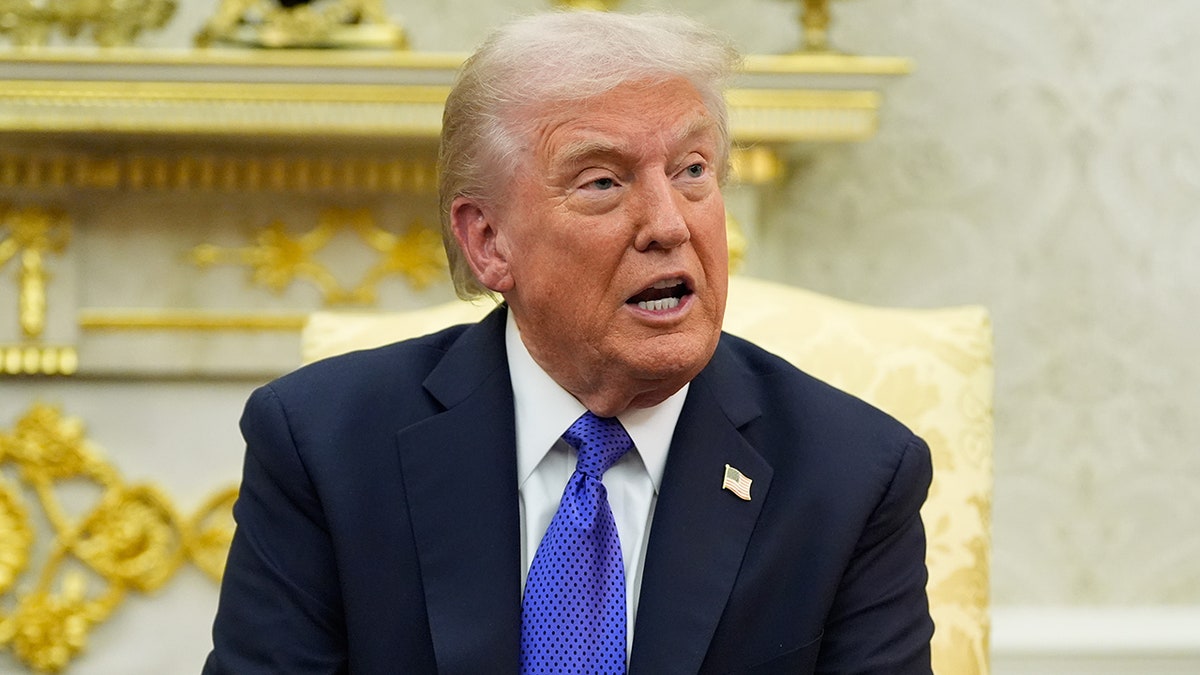
Trump denies B1 bombers flew toward Venezuela amid cartel threats. (AP Photo/Alex Brandon)
«These charges are baseless, and the president’s own public statements make clear that his only goal is political retribution at any cost,» she added.
Her indictment, like the indictment of former FBI Director James Comey, was presented to a grand jury by former White House aide Lindsey Halligan, whom President Donald Trump installed as the acting U.S. attorney for the Eastern District of Virginia last month.
Trump, in September, said he would install Halligan as the top prosecutor for the Eastern District of Virginia, replacing interim attorney Erik Siebert, who resigned under pressure to indict both Comey and James.
«No one is above the law. The charges as alleged in this case represent intentional, criminal acts and tremendous breaches of the public’s trust,» Halligan said in a statement. «The facts and the law in this case are clear, and we will continue following them to ensure that justice is served.»
After the arraignment, it is likely that she will file a motion to dismiss her case for vindictive and selective prosecution, following similar steps taken by Comey’s legal team in Alexandria earlier this week.
She will also file a motion to dismiss her case based on what her lawyers will argue was the unlawful appointment of Halligan in securing her indictment.
CLICK HERE TO GET THE FOX NEWS APP
Lowell, her attorney, has described the case against her as «improper political retribution,» and vowed they would «fight these charges in every process allowed in the law.»
The Justice Department did not immediately respond to Fox News’s request for comment on the case, or whether Halligan or Keller would be joined by any other federal prosecutors in the Eastern District of Virginia.
Speaking to reporters outside the court on Friday, James said the Justice Department is being used as a tool of «revenge,» and a «vehicle of retribution.»
«But my faith is strong,» she told the group that had massed outside the courthouse in Norfolk, Virginia, hours earlier. «I have a belief in the justice system.»
«Never cow down or break or bend. So there is no fear today,» she said. «I will not be deterred.»
Judge Walker set a trial date for Jan. 26, 2026, and ordered parties to appear back in court for motions hearings in early December.
politics,new york,federal courts,donald trump,crime world,virginia
INTERNACIONAL
Robo al Louvre: hallan 150 pruebas de ADN y logran rastrear la ruta que tomaron los ladrones
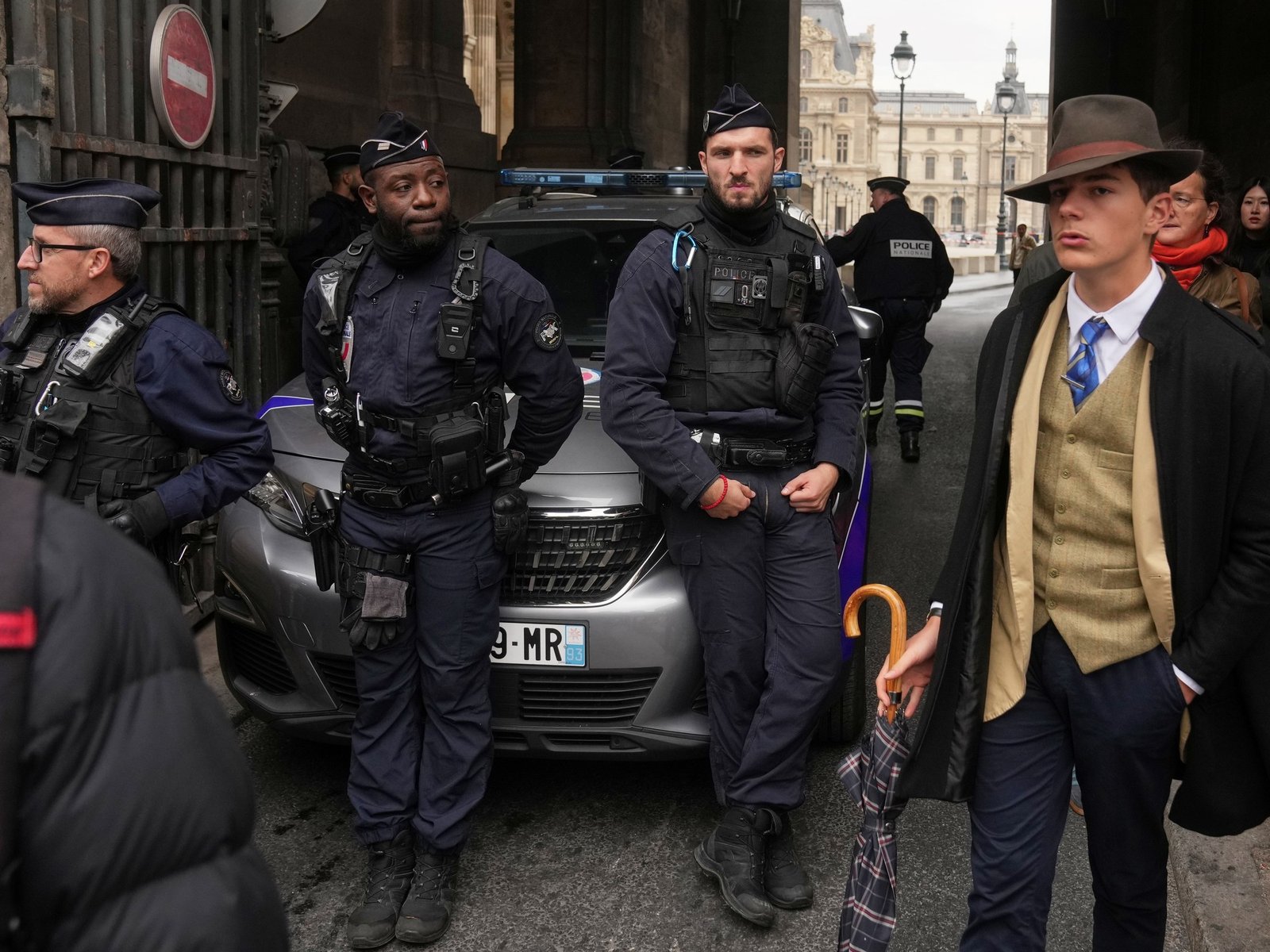
Un ruido enorme
¿Un robo con plan frustrado?
Demasiados robos en el museo

 CHIMENTOS2 días ago
CHIMENTOS2 días agoAdabel Guerrero confesó de qué famosa está enamorada y que le encantaría tener relaciones: «La China Suárez me sorprendió con su belleza»

 DEPORTE2 días ago
DEPORTE2 días agoUniversidad de Chile vs. Lanús, por la Copa Sudamericana: día, horario y cómo verlo por TV

 POLITICA2 días ago
POLITICA2 días agoDiego Luciani, sobre la condena a Cristina Kirchner: “No hay sentencia ejemplar sin recuperar lo robado”












